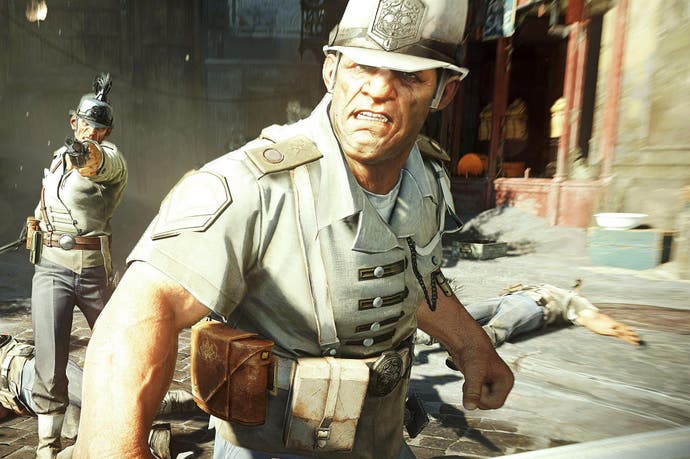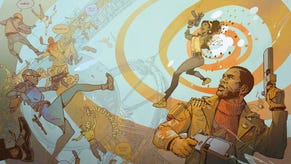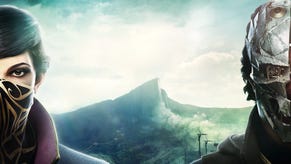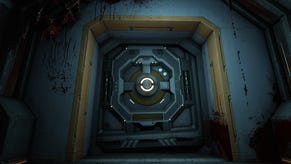Dishonored 2 and the infuriating pursuit of perfection
What does it mean when video games ask us to be faultless?
For all its alluring, intricate world-building (those misty whisky tumblers, the squeaking bench clamps, the crackling electric cables, the perfect uniforms), and distinguished design, there's a part of my brain that recoils when presented with a game like Dishonored 2. It may indeed be possible to enter Karnaca as a kind of aristocratic Rambo, clattering through doors and windows without restraint, head thrown back in deafening laughter while you fire a pair of muskets into the enemy throng. But I can only ever play as a benevolent creeper, clinging to shadows, choking out guards with a whispered "sorry", before gently laying their limp bodies on a nearby banquette, and, of course, stopping to save my progress every few feet. Being spotted in a game like Dishonored 2 is, for me, a fate equal to death: it forces me to load my game in order to maintain the façade of a perfectly clean score sheet.
A recent research paper found that games that allow their players to exhibit their "ideal-self characteristics" are more motivating than those the do not. In other words, if you always wanted to be a creepy boss who constantly hits on staff, then you're going to love Mass Effect, a game that allows you to woo subordinates in your downtime between, y'know, saving the universe and such. But with Dishonored 2, that's not quite it. No person who puts their thoughts into words and complacently publishes them for all to read could ever reasonably claim that their 'ideal self' is a character who cowers and skulks in the shadows hoping that they'll never be noticed. No, with Dishonored 2, my chosen approach is in response to how I believe the designers hope that I will play; I'm trying, in a way, to please them.
Immersive sims pride themselves on providing players with a range of possible ways to approach their problems and obstacles. But any game that reports, via its HUD, whether or not you've been spotted by nearby guards implicitly suggests that you're supposed to go un-noticed. And by offering an achievement to the player who makes it to the end without ever being spotted, Dishonored 2's designers surely betray their hopes: that you will play carefully, not recklessly, and that you will leave things much as you found them.
We play video games using a device called a controller, a word that carries the implication that we, the players, hold the power. But so often control runs in the other direction: from designer to player. After all, the designer sets the challenge that they want solved and, until we are able to meet that expectation through skill or perseverance, we are forbidden from progressing. So much of game-playing is the act of figuring out what is expected of us and then proceeding to meet those expectations. Sometimes those expectations are, as in Dark Souls, left unspoken. Mostly they are plainly stated, in lots of accumulating quests, in post-match stat reports, even in the moment-to-moment interaction between human and machine. 'Perfect' is as familiar a noun to games as 'start', from the Street Fighter victory when your opponent lays defeated and your own health bar untouched, through to the rhythm action carnival, where every button press is evaluated against tempo's immovable measure: 'Miss', 'Miss', 'Perfect'.
In a game like Dishonored 2, the pressure to play perfectly can have a disruptive effect on the journey. The intrusive rhythms of saves and loads became, for me, as much a part of the play experience as any of the more carefully and elegantly designed systems within the fiction. The decision to reload the game, not when my character died but simply whenever she was spotted may have been a self-imposed punishment, but it was encouraged by the broader design. While I could technically have abandoned my modus operandi at any moment, and played more carelessly, by the game's midway point the sunk cost of my effort and caution was too great to let go of. Dishonored 2 offers an enviable range of routes and approaches, but in inspiring me to play without fault, its scope narrowed drastically.
Part of the great appeal of video games - all sports, in fact -- is the way in which they measure and express, in irrefutable ways, your performance. A high score represents your personal best. An online win in a 'Last Man Standing' match creates a clear pecking order. Sometimes the line between success and failure is even clearer. Each of the six hundred-odd puzzles in 2016's The Witness, for example, are either solved or failed. Perfection is the only route to success. Anything less leads to absolute failure. Games that couch their challenge in such plain terms are often as thrilling as they are infuriating. They also risk alienating those of us who fall short, and perhaps, subconsciously at least, cause us to see their creators as cruel control freaks, whose standards we have failed to meet.
For this reason, The Last Guardian, Fumito Ueda's long-absent third game offers something unusual in the medium. Its environmental puzzles may have clear solutions, but as you must rely upon a whimsical, sometimes fickle AI companion in Trico, the creature who accompanies you through much of the game, your route towards these solutions feels far messier and more organic than in The Witness or even Dishonored 2. It's never simply a case of picking up a metaphorical key and plunging it into the metaphorical lock. Instead you must coax and bribe your way to progress. Success is defined somehow in messier terms, and the quest has, therefore, a more life-like texture. Games make clear and simple the lines of success and perfection and, in this way, constantly urge us to better ourselves - albeit within the narrow set of criteria laid down by the designer. Other kinds of self-improvement are possible too, surely, in games -- ones that do not demand perfection, but instead invite reflection, consideration, patience or kindness.











